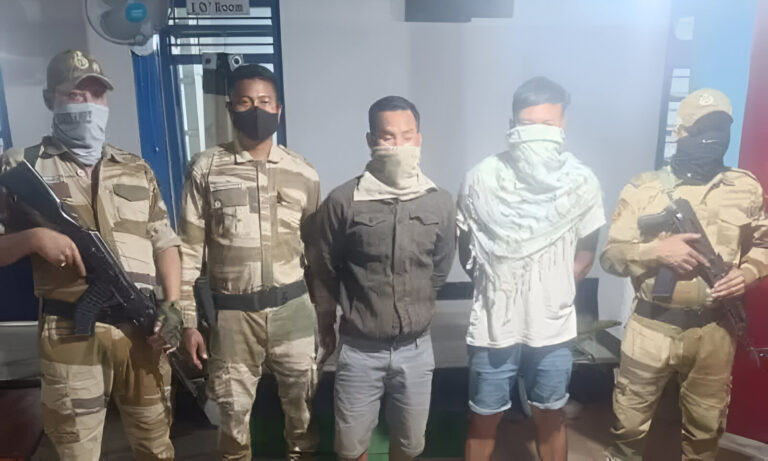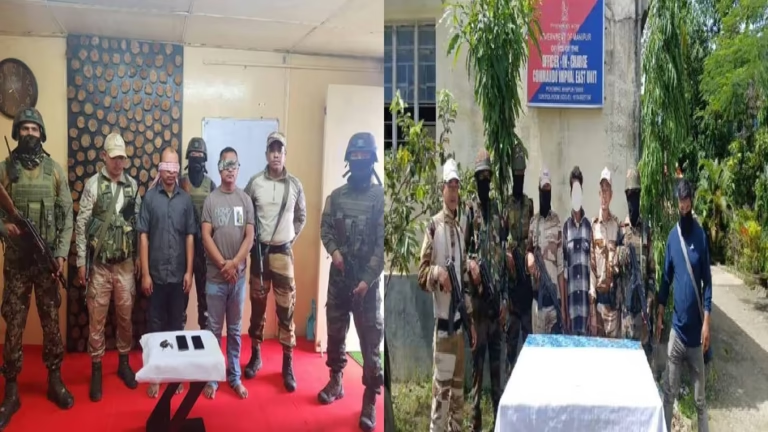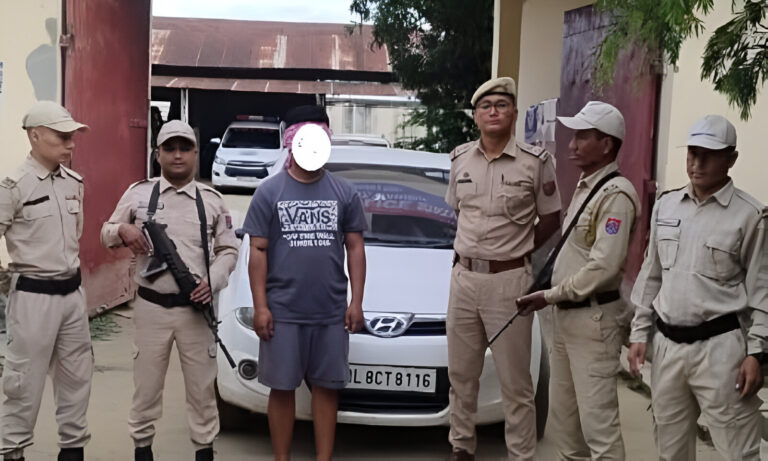Manipur Imposes Night Curfew in Imphal West: A Step Toward Enhanced Security and Order
Imagine your neighborhood turning into a quiet, calm zone after dusk, with the streets gradually emptying as the city embraces an enforced peace. That’s exactly what’s happening in Imphal West as Manipur imposes a night curfew to safeguard its residents and maintain order. Over the past few days, local authorities have taken this bold step to minimize the risk of security threats and ensure that nighttime remains a period of safety rather than uncertainty.
Introduction: The Night Curfew in Imphal West
Picture this: as the sun sets over Imphal West, a blanket of calm descends over the city. Streets that once buzzed with evening life now witness a controlled quiet, thanks to the recently imposed night curfew. This strategic move by Manipur’s authorities is designed to keep potential security threats at bay and ensure that the residents enjoy a peaceful night.
The decision to enforce a curfew isn’t made lightly. It stems from a series of factors that include rising security concerns, the need to manage law and order, and a proactive approach toward preventing incidents during late-night hours. In this article, we’ll dive deep into the many layers of this initiative, exploring its causes, implications, and the varied responses it has evoked among the public.
Understanding the Context: Why a Night Curfew?
Have you ever wondered why a city might choose to restrict movement at night? In the case of Imphal West, the night curfew is not just a reaction to immediate events; it is a strategic response to a confluence of factors that could potentially threaten public safety.
Security Concerns:
In many parts of the world, night curfews are often implemented in response to security challenges. In Imphal West, the decision comes as authorities aim to thwart any potential escalation of violence, criminal activities, or unrest that might be more prevalent during nighttime hours. By limiting movement, the government hopes to minimize the risk of confrontations and maintain a sense of calm throughout the community.
Preventive Measures:
A proactive approach can sometimes make all the difference. Instead of waiting for incidents to occur, the authorities are taking steps to prevent them before they have a chance to escalate. Think of it like putting up barriers around your home before a storm hits—it’s all about mitigating risks in advance.
Background and Precedents: Curfews in Manipur
Curfews have been a part of Manipur’s strategy for managing unrest and ensuring safety during challenging times. Historically, the state has seen various security measures aimed at maintaining order during periods of heightened tension. In this light, the night curfew in Imphal West is an evolution of earlier practices, adapted to the current security landscape.
Lessons from the Past:
Manipur’s experience with curfews has taught both the authorities and the community valuable lessons. Previous implementations have shown that while curfews can disrupt daily routines, they often pave the way for a more secure environment by preventing potential outbreaks of violence. Residents have seen firsthand how these measures, although sometimes inconvenient, can lead to a reduction in incidents and a more stable local atmosphere.
Evolution of Security Tactics:
The current curfew is also a reflection of modern security tactics. With better technology, improved surveillance systems, and more robust communication channels, today’s curfew measures are more precise and less intrusive than those in the past. Authorities now rely on real-time data, community feedback, and coordinated efforts among different agencies to make the night curfew as effective as possible.
The Reasons Behind the Curfew: Security and Order
Why impose a curfew in Imphal West? The answer is multi-faceted, rooted in both immediate security needs and long-term strategic goals.
Containing Potential Threats:
At the heart of the curfew is the desire to contain any potential security threats. By restricting movement during the night, authorities can monitor public spaces more efficiently and prevent situations that might lead to violence or disorder. It’s a classic case of prevention rather than cure—stopping problems before they start.
Protecting Vulnerable Areas:
Certain zones in Imphal West might be more prone to disturbances, whether due to past incidents, geographical factors, or simply the nature of urban activity at night. The curfew helps to secure these vulnerable spots, ensuring that any activities that could disrupt public order are kept under strict control.
Strengthening Community Confidence:
When citizens know that their government is taking proactive steps to ensure their safety, it builds trust. The curfew, therefore, is not just a tool for law enforcement but also a means of reinforcing community confidence in the authorities. When you feel safe, you’re more likely to go about your daily business without the burden of constant fear.
Impact on the Local Community: Balancing Safety and Daily Life
Any security measure, no matter how well-intentioned, can have significant impacts on the daily lives of citizens. For the residents of Imphal West, the night curfew is a mixed bag of benefits and challenges.
Enhanced Safety:
For many, the curfew is a welcome development. Knowing that there is a structured plan in place to keep potential threats at bay can provide immense peace of mind. Parents, in particular, feel reassured that the streets will be safer for their children during the vulnerable hours of the night.
Disruption of Routine:
However, with every measure of safety comes a trade-off. The curfew can disrupt daily routines, especially for those who work night shifts or run businesses that depend on evening activity. Imagine trying to catch a late-night bus or managing a 24-hour store—such disruptions can have economic and social repercussions.
Economic Considerations:
Local businesses that thrive during the night may face challenges due to reduced foot traffic. While the intention is to enhance safety, the economic impact on small enterprises cannot be ignored. Authorities must strike a delicate balance, ensuring that while safety is paramount, the livelihoods of residents are also safeguarded.
Community Adaptation:
Over time, communities tend to adapt to such changes. Residents of Imphal West are already brainstorming ways to adjust their routines, such as shifting business hours or enhancing security measures around their establishments. In many cases, the community’s resilience shines through, turning potential challenges into opportunities for innovation and adaptation.
Government Strategy and Measures: How Authorities Are Responding
The imposition of a night curfew in Imphal West is just one piece of a broader security strategy implemented by the Manipur government. Let’s take a closer look at the multi-layered approach that is helping to steer the region toward a more secure future.
Coordinated Enforcement:
One of the key pillars of the curfew’s success is the coordinated effort between various government agencies. Local police, paramilitary forces, and municipal authorities are working hand in hand to enforce the curfew effectively. This level of coordination ensures that there are no gaps in security, and any potential issues are dealt with swiftly.
Technology-Driven Monitoring:
In today’s digital age, technology plays a crucial role in maintaining public order. Surveillance cameras, drones, and real-time monitoring systems are being used to keep a close watch on critical areas in Imphal West. This technological support not only deters potential offenders but also provides law enforcement with the tools they need to respond quickly if an incident occurs.
Community Outreach Programs:
Beyond enforcement, the government is also focusing on community engagement. Regular public meetings, hotlines, and social media channels have been set up to ensure that residents can voice their concerns and get accurate information about the curfew and related measures. This open line of communication is vital in building trust and ensuring that the curfew is seen as a collaborative effort rather than an imposition.
Emergency Response Mechanisms:
In the event of any incidents during the curfew hours, emergency response teams are on standby to handle the situation. Quick-response units and medical teams are strategically positioned to ensure that any emergency is met with immediate action. This preparedness is crucial in ensuring that the curfew not only prevents crime but also minimizes the impact of any unforeseen events.
Public Reaction: Voices from the Streets of Imphal West
No policy can be fully understood without hearing from the people it affects. The night curfew in Imphal West has sparked a range of responses from the local community—some are supportive, while others have expressed concerns.
Supportive Voices:
Many residents have expressed relief over the imposition of the curfew. They believe that the measure is a necessary step in curbing potential threats and creating a safer environment for families. One local shopkeeper remarked, “I feel more secure knowing that there are extra measures in place at night. It gives me peace of mind as I run my business.” Such testimonials highlight how security initiatives can boost community morale and confidence.
Concerns and Criticisms:
On the other hand, some community members are wary of the restrictions imposed by the curfew. Concerns range from potential disruptions to daily routines to the economic impact on small businesses that rely on nighttime activity. Critics argue that while safety is important, the government must also consider the long-term social and economic effects of such measures. They call for a balanced approach that minimizes inconvenience while maximizing security.
The Role of Media and Social Media:
Media coverage and social media conversations have amplified these diverse perspectives. Platforms like Twitter, Facebook, and local news forums are abuzz with discussions about the curfew. Some residents use these platforms to share their personal experiences and suggestions, contributing to a broader dialogue on how to improve public safety without stifling everyday life.
Challenges and Criticisms: What Are the Concerns?
While the primary objective of the night curfew is to enhance security, several challenges and criticisms have emerged that need addressing:
Economic Disruptions:
For many local businesses, the curfew means adjusting operating hours, which could lead to reduced revenue and additional operational challenges. Business owners are calling for compensatory measures or support programs to help them transition during these restricted hours.
Impact on Personal Freedom:
Some citizens feel that the curfew, while beneficial in terms of security, restricts their personal freedom. The ability to move freely during the night is seen by many as an important aspect of personal liberty. Authorities must tread carefully to ensure that while security is bolstered, individual rights are not unduly compromised.
Logistical Hurdles:
Implementing a curfew in a bustling urban area comes with its own set of logistical challenges. Ensuring that all regions within Imphal West are adequately covered, maintaining proper communication channels, and handling unexpected incidents require constant vigilance and resource allocation.
Balancing Enforcement and Empathy:
There is also the challenge of ensuring that enforcement of the curfew is carried out with empathy and understanding. Heavy-handed measures can lead to resentment and a breakdown in trust between law enforcement and the public. Striking a balance between strict enforcement and compassionate outreach remains a delicate task.
Looking Ahead: Future Implications and Possibilities
What does the future hold for Imphal West in light of this night curfew? While the immediate goal is to ensure safety, the broader implications could pave the way for lasting positive change.
A Safer Urban Environment:
If the curfew proves effective, it could set a precedent for other regions facing similar security challenges. The experience gained here might help authorities refine their strategies and implement similar measures elsewhere, contributing to a more secure overall environment.
Economic and Social Revitalization:
With improved security, there is potential for economic revitalization. As residents and businesses adjust to the curfew, new opportunities may arise—such as the development of safer, more efficient transportation systems and innovative business models that cater to the new normal. In time, the community might see a resurgence in economic activity, bolstered by the confidence that comes from living in a secure environment.
Strengthening Community Bonds:
Perhaps one of the most significant long-term benefits will be the strengthening of community bonds. Initiatives like the night curfew encourage citizens to come together, voice their concerns, and work collaboratively with authorities. This spirit of unity can lead to broader community engagement and a collective drive toward improved living conditions.
Policy Refinements and Innovations:
The lessons learned from the implementation of the curfew in Imphal West can inspire policy refinements and innovations in public safety management. By carefully analyzing what works and what doesn’t, the government can develop a more nuanced, flexible approach to managing security challenges in the future.
Comparative Analysis: Curfews in Other Regions and Their Outcomes
It’s always helpful to look at similar scenarios elsewhere to understand potential outcomes. In many parts of the world, curfews have been implemented as temporary measures during crises or periods of unrest. Let’s examine a few examples:
Global Examples:
Countries facing natural disasters, civil unrest, or escalating violence have often turned to curfews as a means to restore order. For instance, during periods of political instability, certain cities have successfully implemented curfews to allow law enforcement to regain control without resorting to extreme measures. The success of these measures often hinges on community cooperation and transparent communication—elements that are also central to the approach in Imphal West.
Lessons for Manipur:
From these global examples, Manipur can draw important lessons on balancing enforcement with empathy, ensuring economic support for affected communities, and maintaining open channels of communication. By adapting these lessons to the local context, authorities can refine the night curfew measures to better serve the people of Imphal West.
Conclusion: A Step Toward Lasting Peace and Stability
The imposition of a night curfew in Imphal West is more than just a temporary security measure—it is a strategic, forward-looking step toward creating a safer, more resilient community. In these challenging times, the voluntary cooperation of residents, coupled with proactive government measures, serves as a powerful reminder that when we unite for a common cause, we can overcome even the toughest challenges.
While the curfew has stirred debates and raised concerns, its primary goal remains clear: to protect lives and maintain order. As we move forward, it is essential for all stakeholders—government officials, law enforcement, and the community—to work together in fine-tuning these measures. The hope is that through collaborative efforts, the lessons learned in Imphal West will not only enhance local security but also serve as a blueprint for other regions facing similar challenges.
In the end, the story of the night curfew in Imphal West is one of resilience, determination, and the unwavering commitment to safeguarding one’s community. With every hour of enforced calm and every measure taken to ensure safety, Manipur moves closer to a future where peace and progress go hand in hand.
FAQs
Q1: What prompted the imposition of the night curfew in Imphal West?
A: The curfew was imposed as a proactive measure to address potential security threats and maintain public order during vulnerable nighttime hours, ensuring that the region remains safe for its residents.
Q2: How does the night curfew benefit the local community?
A: By limiting movement at night, the curfew reduces the risk of violent incidents, enhances public safety, and fosters a sense of security among residents, even though it may temporarily disrupt daily routines.
Q3: What measures have been taken to ensure the curfew is enforced smoothly?
A: Authorities have implemented coordinated enforcement strategies, utilized advanced surveillance technologies, and set up community outreach programs to ensure that the curfew is both effective and sensitive to residents’ needs.
Q4: How are local businesses and residents coping with the restrictions imposed by the curfew?
A: While some businesses face challenges due to reduced nighttime activity, community leaders and local authorities are working together to adjust operating hours and provide support, ensuring that the impact on livelihoods is minimized.
Q5: What are the long-term goals of imposing the night curfew in Imphal West?
A: The long-term goals include creating a safer urban environment, strengthening community bonds, and using the curfew experience to refine public safety strategies for future initiatives that ensure lasting peace and stability.




